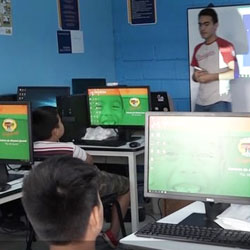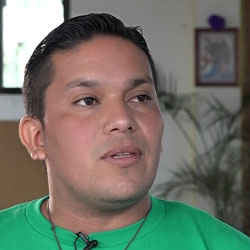cuerpos, HondurasEn un aula abarrotada del Centro de Extensión del barrio 15 de Septiembre, un grupo de hombres y mujeres jóvenes se reúnen para una discusión improbable. El tema es la masculinidad y las conexiones entre el “machismo” (una expresión fuerte y agresiva de la virilidad) y la violencia..
«El machismo plantea que los hombres son el sexo fuerte y que los hombres no expresan sus emociones,» explica Carlos Guzmán, Master Trainer del curso y Subcoordinador de la Región Norte con la Alianza Joven Honduras proyecto, que dirige el curso. «Cuando veo [como un niño] que expresar violencia es una forma de demostrar mi masculinidad, entonces expreso mi virilidad a través de la violencia.»
Mientras Honduras experimenta una de las tasas de homicidios más altas del mundo, Los niveles de violencia contra mujeres y niñas también son alarmantes.
cuatro en 10 Las mujeres hondureñas encuestadas informaron haber sufrido alguna forma de violencia contra mujeres y niñas, según un 2015 A NOSOTROS. Encuesta de la Agencia para el Desarrollo Internacional. Los contribuyentes comúnmente citados incluyeron la cultura patriarcal., machismo, abuso de drogas y alcohol, y la falta de modelos familiares, entre otros.
Para muchas mujeres jóvenes que crecen aquí, Los efectos del machismo son profundos..
“Creo que el machismo afecta a la gente en cuanto a la definición de lo que hacen las mujeres y lo que no hacen los hombres. Creo que nos hace sentir inferiores como mujeres.. los hombres, porque son hombres, tenemos más fuerza que nosotras las mujeres," dice Elizabeth Guity, un participante de 20 años en la discusión del Centro de Extensión.
Como parte del programa más amplio de prevención del crimen y la violencia centrado en los jóvenes, el Alianza Joven Honduras (Alianza Juvenil Honduras) El proyecto está incitando a hombres y mujeres jóvenes a pensar en los estereotipos y cómo ciertas presiones sociales sobre los hombres jóvenes pueden conducir a comportamientos arriesgados y a veces violentos.. El proyecto está financiado por USAID e implementado por Creative Associates International.
Hasta la fecha, El programa ha llevado a cabo talleres de masculinidad en 58 Centros de extensión vecinales a campo traviesa, llegando a más de 2,300 edades juveniles masculinas y femeninas 12 a 30. Los jóvenes toman el curso con compañeros de aproximadamente la misma edad..
Construyendo una nueva “masculinidad positiva”
Guiado por un instructor capacitado., Los talleres de masculinidad de tres partes guían a los jóvenes a través de tres cuadernos de trabajo sobre prevención de la violencia., cómo el machismo afecta a hombres y mujeres y cómo construir una masculinidad positiva que promueva comportamientos y relaciones saludables. Fue desarrollado originalmente por el Centro para la prevención de la violencia en Nicaragua.
Para hombres jóvenes criados en una sociedad que enfatiza ser “duro” e imparte este machismo a través de normas sociales., comportamientos y actitudes, Estos talleres pueden ser la primera vez que encuentren un nuevo prisma a través del cual ver la masculinidad..
El Master Trainer Guzmán dice que años de reprimir emociones y experiencias y actuar “con dureza” es perjudicial para los hombres jóvenes y puede conducir a la violencia..
“Llega un punto en el que tienen que explotar y cuando llega ese momento de explosión, esa catarsis, es cuando puede ocurrir la violencia," él dice.
A través de discusiones francas y ejercicios guiados., Los instructores apoyan a los hombres jóvenes en el desarrollo de una “masculinidad positiva” a través de una comunicación efectiva y la resolución de conflictos., y expresar emociones en lugar de reprimirlas.
Las mujeres y las niñas también desempeñan un papel fundamental en esta transformación., explica Guzmán.
El objetivo es “construir una sociedad con una masculinidad positiva, en el que los jóvenes comprendan dónde está el problema del machismo, cómo podemos solucionarlo y cómo podemos construir juntos una masculinidad positiva," él dice.
Antes de realizar el curso de masculinidad, 18-Romel Alexander, de un año, no había pensado mucho en las formas en que el machismo afectaba su vida. Ahora lo ve: valentía por ser más grande o más fuerte que otra persona y presión para ocultar cualquier debilidad o emoción..
“También hay que tratar bien a la gente," dice ahora, después de tomar el curso. “También fue bueno que viéramos, como hombres, que pudiéramos expresar” emociones.
Las mujeres jóvenes que participan en el curso también están internalizando estos mensajes y llevándolos adelante..
“Sé cómo me puede tratar un hombre., qué trato debo recibir y cómo debo comportarme en la sociedad," dice Guity. “Yo también sé hablar con los niños., no seguir cargando este machismo generación tras generación, pero pararlo con mi ejemplo, con lo que aprendí en ese taller”.
Compartiendo el mensaje para detener la violencia
Llegar al mayor número posible de personas con este mensaje., Los instructores de los talleres de masculinidad preparan mentores y otros capacitadores en las comunidades que luego replican los talleres en las escuelas., iglesias y reuniones comunitarias.
“Este machismo no sólo afecta a los jóvenes, pero afecta a toda la familia; juventud, adultos, niños, adolescentes, padres, madres,” dice Guzmán. "Cuanto más acceso tenga la gente a la metodología, más fácil será abordar el problema".
Alumnos del curso creen que puede ser una herramienta para prevenir la violencia. Muchos dicen que planean desempeñar un papel en la difusión del mensaje entre sus pares y la próxima generación..
“Puedo afectar la comunicación," dice Alejandro. "Mañana, cuando sea mayor, tomaré lo que he aprendido [en el curso] para dar ejemplo a mis hijos”.
Con reporte de Emanuel Rodríguez


